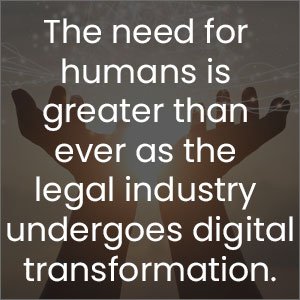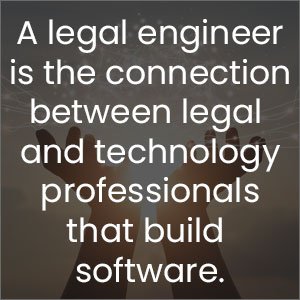There is the law, and there is technology. There are lawyers, and there are technologists. But how are the two being connected to transform the industry? Or better yet, who is combining the two in order to do the same? Manpreet Dhillon, Head of Legal Transformation, explains why legal engineers are so critical to the digital transformation of the legal industry:
All rise.
Artificial intelligence (AI) has entered boardrooms and offices around the world. The technology is helping businesses to run smarter, faster, and more efficiently. So it’s no surprise that AI has also entered the courtroom to help accelerate productivity, create greater consistency, and exceed customer expectations. Using algorithms, data analytics, and machine learning, AI-powered solutions are now completing the time-intensive, low-value work once done by interns or first-year law clerks. Sure, the rise of artificial intelligence has brought with it a fear that robot lawyers will take over. But that fear couldn’t be more misguided. In fact, the need for humans is greater than ever as the legal industry undergoes its digital transformation.
WHY THE DIGITAL TRANSFORMATION OF THE LEGAL INDUSTRY NEEDS HUMANS
A legal engineer is a connection between legal and technology professionals that build software. Technology can help make the legal process more efficient by creating a more data-driven enterprise. It can make contract management more accurate, yet far less tedious. But as Roland Vogl, executive director of CodeX, says:
“As long as there are humans, there will be human transactions and human disputes, and we need humans to resolve them. But the machines can help us take the tedium out and to handle the low-level things so that we can focus on the legal judgment. That’s really what lawyers and legal professionals are best at.”
Humans are needed to help evolve the legal industry. As more and more technology is used, those people need to be educated on the solutions that they adopt. Still, not every legal professional can be expected to be an expert in law and technology. This is the expectation placed on the legal engineer.
LEGAL ENGINEERING AIMS TO SYSTEMATIZE ROUTINE COMMERCIAL LEGAL TASKS
WHAT IS A LEGAL ENGINEER?
A legal engineer is a connection between legal and technology professionals who work together to build software. Most often, a legal engineer is a lawyer who has developed technical skills. Rather than focusing on one area of the law, they specialize in the processes or aspects of the law that technology is being used to improve.
Legal engineers in the UK, for example, are devising new ways to edify machines and AI engines to improve legal function. In the future, many clients will want abstractions and machine learning based on Brexit hardship clauses – something we didn’t work on previously.
The origin of legal engineering isn’t agreed upon, generally speaking. But many credit Richard Susskind, “the founding father of legal tech.” He had a rather theoretical view of legal engineering and saw the early form of legal engineering as bespoke. Today, we’re moving to a very standardized, out-of-the-box form of legal engineering. The goal is to meet the needs of clients who are looking to digitally transform their business faster and more efficiently than a bespoke solution ever can.
The need for humans is greater than ever as the legal industry undergoes digital transformation.
HOW DOES LEGAL ENGINEERING WORK IN CONTRACT MANAGEMENT?
Legal engineering within contract management has a very basic use case: manual abstraction and migration. Manual abstraction involves people – usually lawyers – going through contracts, picking out key clauses, and placing them in an Excel sheet before migrating them to a system in order to automate contracts of clients. Here at ContractPodAi, we utilize artificial intelligence to routinize commercial legal practices as part of the automation process.
A legal engineer is someone you’ll encounter in any organization that has a well-defined in-house legal team. As more in-house legal teams rely on artificial intelligence and legal analytics, they are bound to have one. And they may not be a legal engineer. They might be a document analyst or AI systems expert, too.
WHY DOES THE LEGAL INDUSTRY NEED LEGAL ENGINEERS TO HELP WITH DIGITAL TRANSFORMATION?
In this day and age, streamlining the legal function is one of the top priorities. This is not only from an operations perspective but from an evidence-based one. So when it comes to an AI engine, legal engineers handle almost everything that’s under the radar. Think about the signing and redlining of documents in negotiations, to end users signing the same.
Digital transformation is happening fast. And it’s happening within entire organizations. When we streamline the legal process, making it more efficient, we contribute to the efficacy of the business as a whole. Legal engineers, in particular, help to facilitate this evolution of the legal profession while ensuring that we continue to play a high-value role in the future. Check out our e-book, “Three Stages of Legal Digital Transformation,” to get you started.
Author:

Manpreet Dhillon
Connect with us on Linkedin










